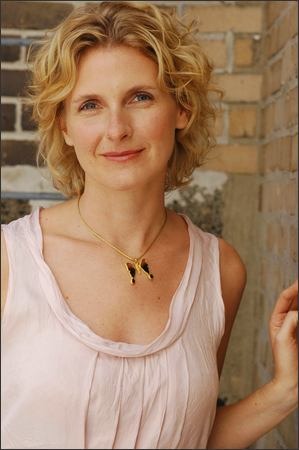Bestselling author Gilbert reflects on success
It would not surprise the hundreds of adoring fans who packed Zoellner Arts Center’s Baker Hall in late April to learn that Elizabeth Gilbert considers herself inordinately blessed.
It is not, however, the result of her phenomenally successful book, Eat Pray Love, which sold millions of copies and spawned a movie starring Julie Roberts. Nor is it due to the fact that her post-divorce spiritual journey led her to exotic locales around the world and wrapped up with an improbable, but true, fairytale ending.
Her good fortune, she said, is that she was only good at one thing: writing.
“I can only see it as a stroke of luck that I wasn’t born multi-talented,” the willowy Gilbert told her overwhelmingly female audience. “I can’t draw. I can’t dance. I know absolutely nothing about the natural sciences. I’m not athletic. I’m not competitive. I don’t even have a good sense of direction—not a good thing for a world traveler.”
But Gilbert said she knew at a very young age that she could artfully express herself through her writing, which flowed onto the paper from her fingertips.
Flipping through a childhood diary, she came across a description she wrote of sledding behind her home on an icy Christmas night.
“I described it as ‘riding a thoroughbred that had been stung by a bee.’ Pretty good, for only like seven or eight, right?” she asked. “I remember thinking at the time: Nailed it.”
Pressure to do it again
In a further stroke of good fortune, she realized she loved the only thing she was good at, sparing herself years of career angst. After graduating from New York University, she earned a living through waitressing and bartending while continuing to write and submitting articles to magazines, with little success.
That changed at some point in her mid-20s, when Esquire magazine accepted an article and she launched her career as a professional writer, with regular bylines in GQ, the New York Times Magazine, and Spin.
Three books followed, but commercial success eluded her until the soul-baring, cathartic Eat Pray Love struck a responsive chord with critics and readers alike, propelling her into the literary stratosphere.
“It’s almost comic when people ask me if I saw it coming,” she said. “There was nothing in my life that even suggested what ultimately happened. It’s selling millions and millions of copies all over the world, Oprah wants me to come onto her show, Julia Roberts wants to play me … at a time when even I didn’t want to be me.”
But with the incredible success of Eat Pray Love came the pressure to “do it again. Only different. And better.”
Her next effort was, in her estimation, a miserable failure—“terrible and unsalvageable”—and she found herself hovering on the precipice of despair as she struggled to regain her footing. What followed were months when she didn’t commit a single word to paper, and channeled her creative energy into gardening on the small property surrounding her Frenchtown, N.J., home.
It wasn’t until she stood in her garden on a brisk autumn morning, and watched as the breeze coaxed the last leaf from a neighbor’s towering oak tree, that she discovered she could write again.
“As it fluttered to the ground, the first sentence of my next book landed in my head,” she said. Within two months, she had the first draft of the book that become Committed, her study and contemplation of marriage that debuted atop the New York Times bestseller list.
Gilbert’s talk at Lehigh—the latest in the Zoellner Arts Center’s “Notation” series—was also sponsored by the Creative Writing Program, the Visiting Lectures Committee, the Women’s Center, the Chaplain’s Office, the Dialogue Center, and the Pennsylvania Council on the Arts.
Posted on:


